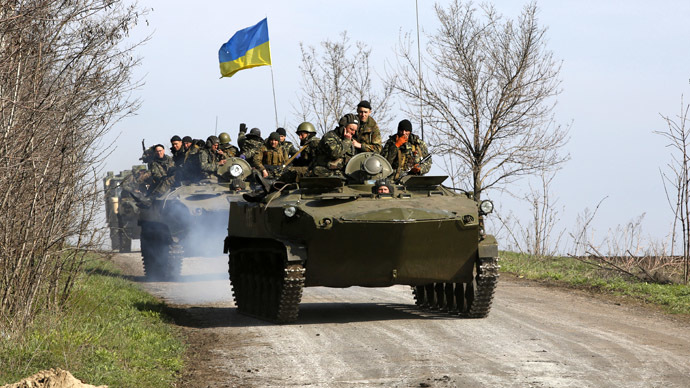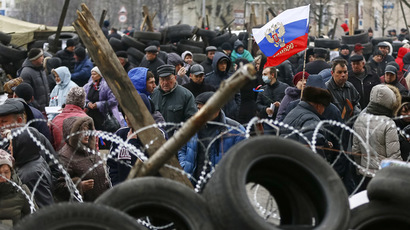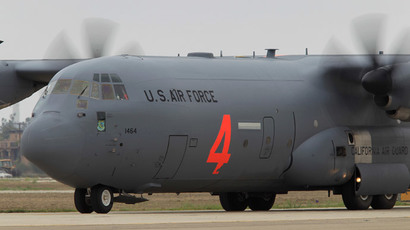Kiev promises Russian language status choice as military op enters ‘inactive phase’

Kiev has promised to let the regions decide on the status of any languages on their own, calling for “peace and unity.” Troops remain in eastern Ukraine, although the military operation has been rendered “inactive.”
Follow RT’s LIVE UPDATES on military operation in eastern Ukraine
Ukraine’s coup-imposed acting Foreign Minister Andrey Deshchytsa on Friday confirmed that the so-called “anti-terrorist operation” is continuing in eastern Ukrainian, despite the calls for de-escalation of the crisis stated in the four-side April-17 agreement between Ukraine, Russia, the US and the EU.
“The operation continues and its intensity will now depend on practical implementation of the agreements, return of seized buildings and surrendering of arms,” Deshchytsa told journalists at a briefing.
The Kiev authorities are expecting that the illegal armed groups will act in accordance with the treaty and “use the chance given to them by the Ukrainian government,” Deshchytsa was quoted as saying by RIA Novosti.
However, the operation will for now enter an “inactive phase,” Ukrainian Security Service spokesman, Marina Ostapenko, told the local Ligabusinessinform agency.
“In connection with Easter holidays and with the Geneva agreements, the work is currently in inactive phase. The command staff are working, and re-planning is in progress,” Ostapenko said.
Promises of peace
Coup-imposed Ukrainian acting President Aleskandr Turchinov and Prime Minister Arseny Yatsenyuk appeared in a televised address on Friday, calling for “national unity” and urging all to “refrain from violence.”
“The Ukrainian government is ready to carry out thorough constitutional reform, which will define the authority of the regions,” Yatsenuk said.
Local authorities in Ukrainian regions “will decide on their own” about whether to grant the Russian language or any other languages official status in the regions, Turchinov added.
Deshchytsa said Ukrainian constitutional reform was discussed in Geneva on Thursday, although no details of the discussions were reflected in the text of the treaty.

The issues of the country’s federalization, for which eastern Ukrainians are pushing, and the regional status of the Russian language, were in the focus of the talks.
The official said no consensus on the issues was reached, but added that “we must continue working with Russia, with the support of our international partners to find a solution to these questions.”
Meanwhile, the OSCE mission on Ukraine has been ordered to start its work. According to the April-17 Geneva treaty, the mission is to play “the leading role” in de-escalating the political crisis in Ukraine.
“In Vienna, despite the Easter holidays, the work has started, the mission on Ukraine has been ordered to start acting immediately,” Russian OSCE envoy Andrey Kelin told Itar-Tass on Friday. Deshchytsa later said the mission is already working in eastern Ukraine.
‘You disarm first’
The joint Geneva statement on Ukraine on Thursday called for “immediate implementation of de-escalation measures,” including the disarmament of all illegal armed groups, vacation of illegally seized buildings, occupied streets, squares and other places in all Ukrainian cities and towns.
The statement stressed that “all sides must refrain from any violence, intimidation or provocative actions.”
On the ground in the volatile eastern Ukrainian Donetsk region, the agreement was largely welcomed. However, the local protesters doubted that the Kiev coup-imposed authorities will be keen to follow its calls.
The Geneva agreement “should partly calm down the population,” believes the Donetsk city mayor, Aleksandr Lukyanchenko, adding that it will only work if “all sides” of the treaty adhere to it.
“Speaking of concerns that the south-east will be seized by another country – our neighbor’s [the Russian] government has once again confirmed that it is not going to happen,” Lukyanchenko stressed.
A senior representative of the local Communist Party (KPU) in Slavyansk, which has been in opposition to the coup-imposed Kiev government and supports the federalization of the country with wider powers for the regions, told RIA Novosti that the protesters view the treaty positively and “are ready for compromise.”
However, he added that people are concerned with different interpretations of the agreement.

“We watched [Russian Foreign Minister Sergey] Lavrov, we are quite happy with what he has said. But the Ukrainian side has interpreted the agreements in an absolutely different way,” KPU’s Anatoly Khmelevoy told the agency on Friday.
“It will not take long to disarm, to dismantle the barricades – but where are the guarantees? [The Kiev authorities] need to reach out to us. The talks of preparing a referendum – we still see no steps in this direction. We need to trust each other, for that we need to sit down at the negotiation table – but no one has so far invited us to talk,” Khmelevoy said.
The self-proclaimed Donetsk Republic meanwhile said it will not follow the treaty’s calls until Kiev starts doing so. Speaking to Itar-Tass, the republic’s chair, Denis Pushilin, said that the Kiev authorities are “refusing to pull back the troops from the territory of the Donetsk Region, and in those conditions it is impossible to talk of compromise.”
Kiev “must vacate the seized buildings, disarm the illegal armed groups – the National Guard and the Right Sector – and free all the political prisoners,” Pushilin stressed. “After that, we will be ready for dialogue.”
However, speaking to journalists on Friday, the coup-imposed Ukrainian foreign minister said that Kiev activists do not have to quit Independence Square (Maidan) because it has been occupied “legally.”
Deshchytsa stressed that the amnesty law for eastern Ukrainian protesters, which Kiev says has already been tabled for a vote in the Ukrainian parliament (the Verkhovna Rada), will only be applied after “complete disarmament” of the protesters in the region and total vacation of administrative buildings.














